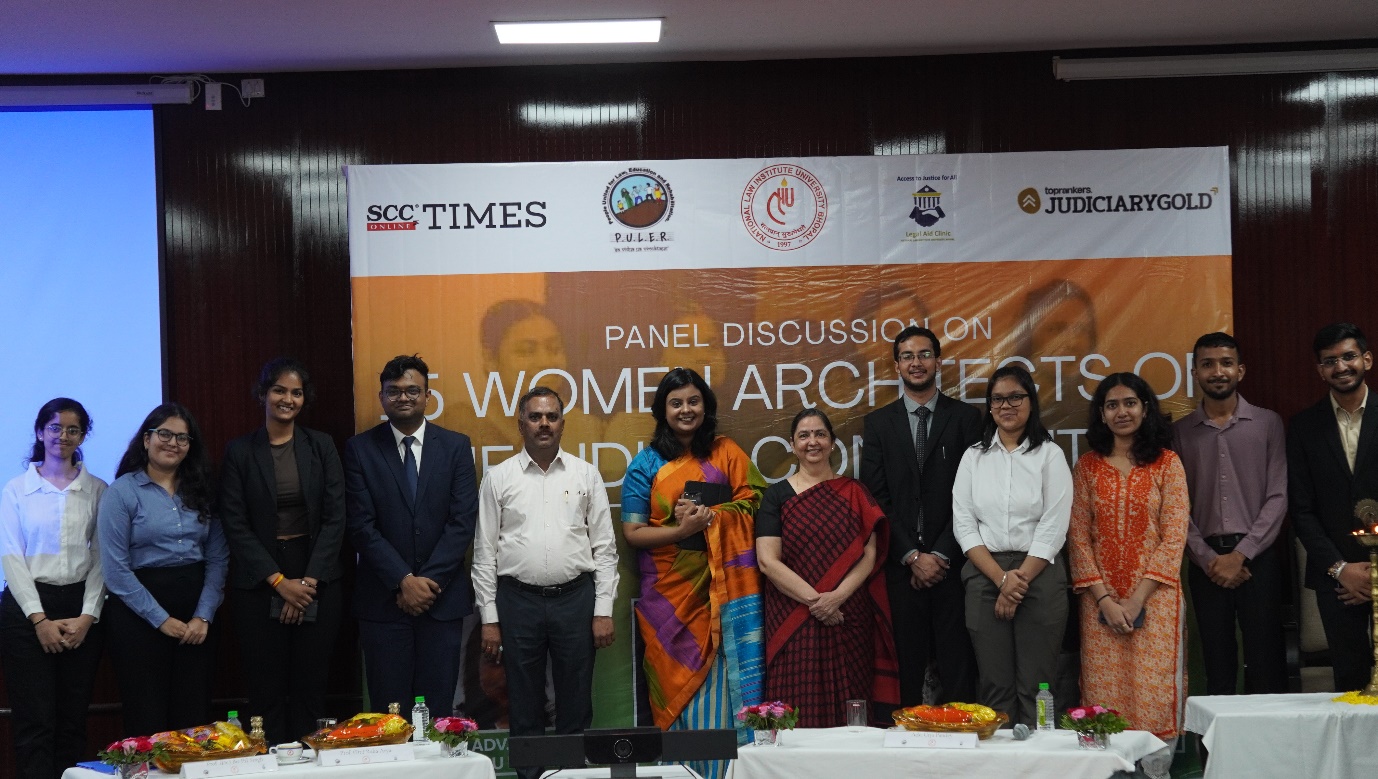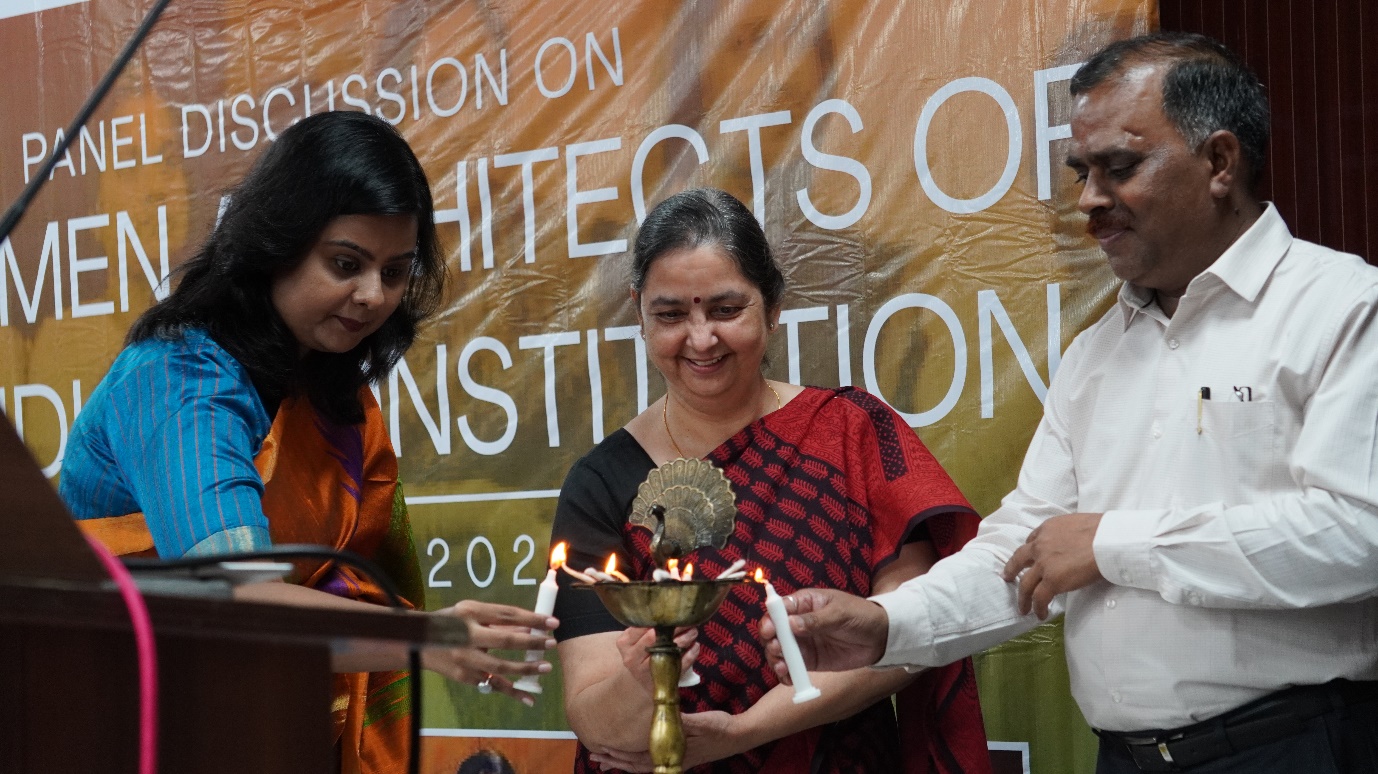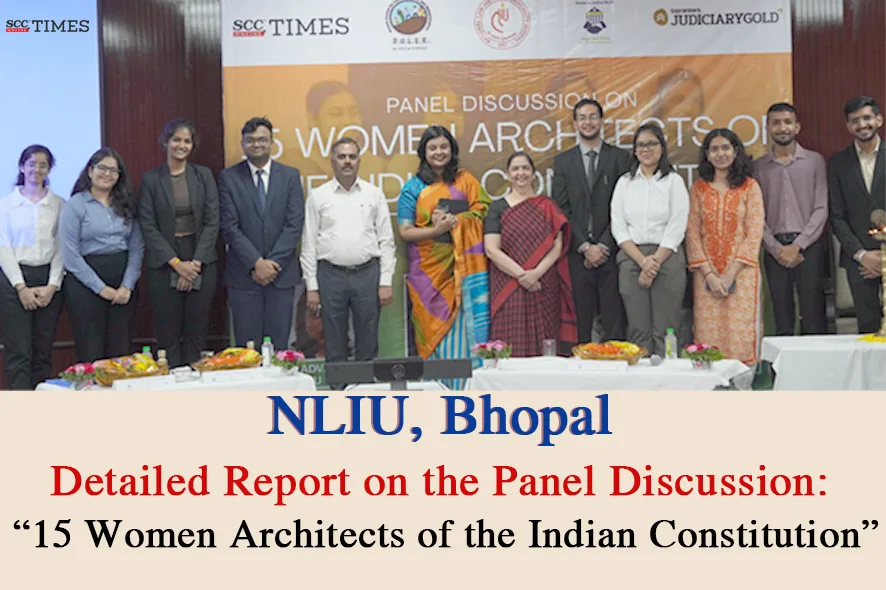The Legal Aid Clinic (LAC) of the National Law Institute University, Bhopal, in collaboration with the People United for Law, Education, and Rehabilitation (P.U.L.E.R.), organised a panel discussion on “15 Women Architects of the Indian Constitution” on August 12, 2025 at the Rajiv Gandhi Cyber Law Centre, NLIU Bhopal. The event was sponsored by Judiciary Gold, with SCC Online Times serving as the media partner.

The discussion aimed to rediscover and honor the legacy of the fifteen extraordinary women who served in the Constituent Assembly between 1946 and 1950, actively contributing to the creation of India’s constitutional vision. These women, representing diverse backgrounds as lawyers, educators, reformers, and freedom fighters, engaged deeply with critical issues including gender justice, minority rights, caste discrimination, secularism, and property reform.
Through this session, the panelists explored important themes such as elite representation versus intersectional inclusion, feminist legal reforms, institution-building, reservations and minority rights, and the politics of public memory. The distinguished panel featured Advocate Dr. Shalu Nigam, Advocate Urja Pandey, Professor Dr. Raka Arya, and Professor Dr. Bir Pal Singh, with Adv. Dr. Nigam joining the discussion remotely.
The event commenced with the ceremonial lighting of the lamp, followed by an introduction and felicitation of the distinguished panel and guests.

The Moderator, Ms. Shambhavi Anand, fourth year student and Treasurer of the Legal Aid Clinic, started the discussion by highlighting that while names like B.R. Ambedkar and Sardar Patel are household names, few are aware of the contributions of women like Ammu Swaminathan, Hansa Mehta, and Dakshyani Velayudhan. She then invited Advocate Dr. Shalu Nigam to introduce the forgotten architects of Indian Constitution.
Why is it important to remember the contributions of the “Founding Mothers” of the Indian Constitution?
Adv. Dr. Shalu Nigam delivered an address on “The Founding Mothers of India’s Constitution.” She began by tracing the historical trajectory of the women’s movement in India, noting early milestones. In this context, she credited Hansa Mehta for her pivotal role in shaping the Universal Declaration of Human Rights (UDHR), notably by changing the phrase “All men are born free and equal” to “All human beings are born free and equal” in Article 1.
The discussion then moved to the prominent women members of the Constituent Assembly and their individual contributions like Ammu Swaminathan, Annie Mascarene, Begum Aizaz Rasul, Dakshayani Velayudhan and Durgabai Deshmukh who are remembered for their advocacy and contributions to the Constitution. Other key figures included Sarojini Naidu, Leela Roy, Malati Choudhury, Utkal Navjeevan Mandal, Purnima Banerji, Rajkumari Amrit Kaur, Renuka Roy, Sucheta Kriplani, and Vijayalakshmi Pandit.
Finally, Adv. Dr. Nigam reflected on the collective legacy of these “Founding Mothers.” They opposed regressive practices such as child marriage, demanded progressive reinterpretations of religious texts, and ensured that constitutional provisions including Fundamental Rights and Directive Principles of State Policy (DPSP) protected women’s interests. Their efforts laid the groundwork for later reforms such as the 73rd Constitutional Amendment, which has enabled over 1.4 million women to serve in Panchayati Raj institutions. She concluded by asserting that the rights enjoyed by women in contemporary India are the fruits of these women’s relentless struggle, and that they must be remembered not merely as wives or daughters, but as equal citizens, leaders, and visionaries in their own right.
The Moderator then invited Advocate Urja Pandey to address the underrepresentation of women in the higher judiciary.
What are the challenges to female representation in higher levels?
Adv. Pandey began by expressing deep concern over the stark underrepresentation of women in the higher judiciary, pointing to the disproportionate number of men in these positions. She questioned why, in a nation built upon moral foundations and renowned for its humanitarian ethos, women still have to ‘seek’ basic fundamental rights, equality, and equal respect. She challenged the prevailing prejudices against women in law, asking why there remains an exclusionary attitude towards them and why their competence is often judged through a male-dominated lens. Citing a telling example, she noted that the first woman judge in the Supreme Court was appointed only in 1989, decades after independence.
According to her, there are structural barriers within the profession, explaining that while women in the lower judiciary secure their positions through competitive examinations and interviews, appointments in the higher judiciary are often based on personal references, an area overwhelmingly dominated by men. This, she urged, raises the question of whether men are still deciding the professional worth of women.
When asked by the Moderator about her views on reservation for women, Adv. Pandey voiced her unequivocal support, backing her stance with statistics. She highlighted that, according to a global index on female representation in parliaments, India ranks 144th out of 193 countries, falling behind nations such as Bangladesh and Pakistan despite having had eminent female leaders like Indira Gandhi.
Responding to another question on the Supreme Court’s recent ruling mandating three years of practice at the Bar as an eligibility criterion for judicial service examinations, she remarked that after five years of pursuing an undergraduate law degree, an additional three-year practice requirement before even appearing for the judiciary exam imposes a particularly heavy social burden on women. Concluding on a note of optimism, Adv. Pandey expressed hope that with the increasing number of female law students, there will be a corresponding rise in the recognition and advancement of women in the legal profession.
Noting concerns over the rise of pseudo-representation despite the increase in female participation in local governance, the Moderator transitioned to a question on the necessity of affirmative action for women.
Is affirmative action for women still necessary today?
Offering a counterpoint, Prof. Dr. Raka Arya observed that while the reservation of seats for women in panchayats remains relevant to the ideal of widening participation, reservation itself is not a panacea. She cautioned that the persistent demand for reservation can inadvertently signal doubt about women’s merit. Noting that many of the constitutional women shared Gandhian influences, she urged that issues not be viewed through a narrow gender lens.
Elaborating with reference to Hansa Mehta, Prof. Dr. Arya recalled both Mehta’s interventions and words, stressing that these leaders sought social and political justice, not preferential “backdoor entries.” She further highlighted the “Sarpanch Pati” phenomenon, where elected women are treated as proxies for their husbands.
On the three-year practice requirement for eligibility to sit for judicial service examinations, she asked whether this was a corrective measure responding to performance gaps, while emphasising that law must rest on a shared social ethos, not gendered presumptions. Reflecting on her early professional years, she acknowledged the lengthy path to becoming a lawyer and recent shifts in legal education. Parental anxieties about daughters in the profession, she argued, should be addressed at their root; society must expand the freedom and autonomy women enjoy, and lawyers should not be assessed through a gendered lens.
Finally, she underlined the continued need to build familial and societal support systems for women. She concluded that if the constitutional women could oppose reservation with clarity in their time, then a society that claims progress should focus on rectifying the causes of differential treatment rather than relying on quick fixes.
Prof. Dr. Bir Pal Singh stated his position against it, encapsulating his reasoning in the remark: “Law lies with the society and dies with the society.” He explained that laws emerge from the necessities, values, and structures of their time, and must evolve alongside societal change.
He argued that while originally intended to integrate marginalized groups into mainstream society, reservation has also contributed to keeping caste identities alive in the public and political sphere.
Reflecting on the period between 1950 and 1995, he observed significant gains for women in terms of dignity and status. Today, women participate in governance structures, including panchayats, though in many cases decision-making power still rests with men. Referring to the fifteen women who were part of the Constitution making process, he emphasized that their legacy indicated that Indian society had advanced considerably from that era.
Prof. Dr. Singh urged the younger generation to focus on practical efforts to change the social hierarchy and build a more equitable system. He concluded by reiterating that reservation can be valuable only if it has a clear purpose and a defined end date, leaving the audience with a final question for reflection: “Who needs reservation, and to what extent?”
How do we measure equality in real terms?
After the other speakers had shared their views, Adv. Dr. Nigam revisited the discussion emphasizing that while conversations on gender parity are not new, meaningful progress depends on taking concrete and actionable steps. This, she argued, requires a critical examination of why women continue to be excluded from higher-level positions. It is essential, she said, to question both their opportunities for growth and the value attributed to their contributions.
Focusing on career progression, she urged that when a promotion to a higher post is at stake, we must ask why women are so often overlooked. Drawing from her own personal experience, she shared how societal and familial pressure can force women into early marriages, setting them back in their professional aspirations an issue that is deeply structural.
Adv. Dr. Nigam observed that patriarchy still holds a stronger grip than the constitutional promise of equality. To break this, she stressed the need to increase women’s participation in the workforce so that fairness is embedded in the system and women can establish truly independent careers. Equality, must not only be a metric we attempt to measure but a principle we actively practice in every sphere of society.
Following the panel discussion, the Moderator opened the floor for audience questions. The first question addressed the perceived misuse of reservations and whether the focus should now shift towards women’s empowerment, given repeated attempts to bypass or undo existing reservation policies. Responding, Adv. Pandey observed that such policy matters are ultimately subject to the will of the majority and the decisiveness of the government. Drawing a parallel with the removal of Article 370, she noted that if the government wishes to revisit reservations, it possesses the authority to do so.
The second question, posed by a second-year law student, inquired about the extent to which reservations should be provided and the contrast between the founding mothers’ position on reservations and the 106th Constitutional Amendment. In response, Prof. Dr. Arya described the situation as deeply concerning, noting the irony that institutions with poor gender representation still retain recognition under global platforms such as the United Nations. She emphasized that legal equality does not always translate into social equality, and stressed the importance of adopting a person-centric approach to equality rather than confining it within gender labels.
The session concluded with a vote of thanks delivered by Ms. Shreya Mittal, a fourth-year student and Co-Convenor of P.U.L.E.R., who expressed gratitude to the esteemed panellists and the audience for their insightful contributions and active engagement. This was followed by the singing of the National Anthem, marking a solemn close to the discourse.


